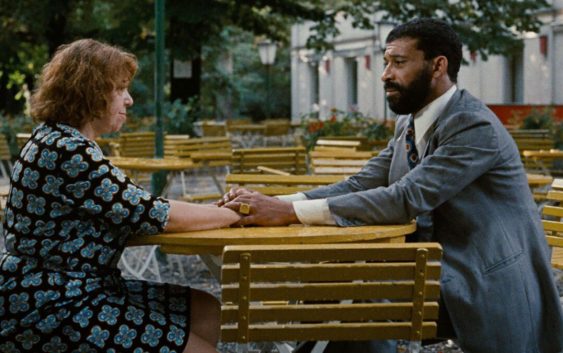High School Programme 14. PFF

This year’s High School Programme of the Educational Programme returned to the format of a few years ago, which is one central screening organized in the Youth Cultural Center for students from Skopje, and the students from other cities had the opportunity to watch screenings of the selected film in their schools. As this year’s video lecture, in collaboration with the Goethe-Institut Skopje, we have chosen “Ali: Fear Eats the Soul [Angst essen Seele auf, 1974]”, a classic by the German director Rainer Werner Fassbinder.
The film screening was held on April 9, in the presence of a hundred students from several High Schools from Skopje: SUGS “Orce Nikolov”, SUGS “Nikola Karev”, SUGS “Georgi Dimitrov”, SGGUGS “Zdravko Cvetkovski” and DSULUD “Lazar Lichenoski”. After watching the film, Viktor Jovanoski, M.Sc., connected the film with the theme of the Competition for the Best Philosophical Essay. The topic on which the students, under the guidance of their teachers, wrote their essays this year was: “Fear, prejudice, and the image of the other: how to find the human in ourselves?”.
During the month of April, screenings of the film were also held in about twenty other schools across Macedonia: Bitola, Bogdanci, Veles, Vinica, Gevgelija, Debar, Demir Hisar, Kavadarci, Kriva Planka, Krushevo, Negotino, Ohrid, Probishtip, Radovish, Sveti Nikole, Struga, and Shtip. We estimate that around 700 students participated in this activity. By the scheduled deadline (May 5), about twenty students had sent their essays, and the three best among them will be selected by the three-member expert committee consisting of Jasmina Popovska, Marija Todoroska, and Nikola Stojkoski. The awards ceremony will take place at a special event at the Cinematheque on June 3 at 1:30 p.m.
The three first-prize students will receive a one-year scholarship from the “Europa Prima” University of Audiovisual Arts, financial prizes, special prizes from the Goethe-Institut Skopje, a set of philosophical literature and magazines from the publishing house “Az-Buki” and the Philosophical Society of Macedonia, as well as a set of DVDs with Macedonian films from the Cinematheque of S. Macedonia. The winning essay, like every year, will be published in the magazine “Philosophical Tribune”.
9.4 (Tuesday)
17:30 Frosina Cinema (free screening)
ALI: FEAR EATS THE SOUL [Angst essen Seele auf, 1974]
Rainer Werner Fassbinder, DE, 93’
In 1970, the Filmmuseum in the City Museum of Munich presented a small retrospective of the long-retired Douglas Sirk, derisively considered “the foremost director of sentimental women’s pictures” and “the master of Hollywood melodramas.” Twenty-five-year-old Rainer Werner Fassbinder, a recent debutant, attended each one of the six screenings. “I would like to have seen them all, all 39 of them,” he wrote the following year in the February issue of “Film und Fernsehen,” in a lengthy review that almost single-handedly, overnight, rehabilitated the German director in exile and established him as an indispensable auteur. “But so far I have only seen six films by Douglas Sirk. Among them were the most beautiful in the world.”
Filmed four years after this retrospective, “Ali: Fear Eats the Soul” is the work through which Fassbinder most directly expressed his admiration for Sirk. An homage to “All That Heaven Allows” (1955)—in which, to the dismay of those around her, an elderly upper-class widow [played by Jane Wyman] enters into a relationship with a younger man of lower social standing [Rock Hudson]—this simple, Bressonian-like film is a touching intergenerational and interethnic romance that follows the quiet affection and tumultuous love of Emmi [Brigitte Mira], an elderly cleaner from Munich, and Ali [El Hedi Ben Salem], a young Moroccan Gastarbeiter.
And all the goodness in people that Sirk tried to find in the wealthy suburbs of New England, beneath the thick palettes of lavish Technicolor, finds even greater resonance in Fassbinder’s dirty, harsh, and gray world, against the impoverished German language of the migrants and the mundane concerns of low-paid cleaners. It is as if the love between Emmi and Ali, while devolving into something less than love, simultaneously transforms into something deeper and more enduring: a warm, naively tender interpersonal care.
Filmed on an almost non-existent budget and in just fifteen days—”so quickly,” says Roger Ebert, “Fassbinder only had time to tell the truth”—”Ali: Fear Eats the Soul” is perhaps the most beautiful film of the enfant terrible of the German New Wave, and certainly one of the most powerful ever made in exploring otherness, stereotypes, and prejudices, as well as the eternal struggle for humanity in an increasingly indifferent and hopelessly cynical world that seems capable of believing in everything—except kindness and love.

